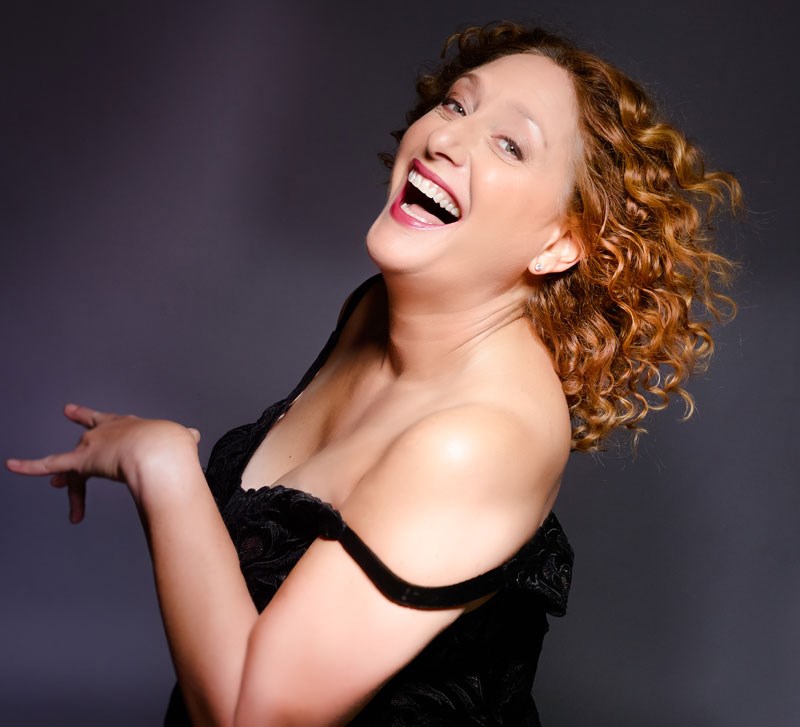Judy Gold is a living testament to poet George Herbert’s legendary proclamation, “Living well is the best revenge.” But the stand-up, actor, writer and self-proclaimed “big mouth” is rarely content – especially not in recent weeks.
In keeping with the psychological profile of seemingly every comedian throughout history, discontent is Gold’s fuel, and the tragicomedy of the human race all too often penetrates whatever patches of her skin have yet to callous. In the midst of the Trump administration’s first days in the White House, her rage is a white noise that never shuts off, but her emotions are still too raw for her to find a joke in it. In the meantime, it at least helps her let off steam to say, “Someone’s gotta stop this fucking asshole.”
Gold, who performs next Friday (Feb. 24) as part of the Chutzpah! Festival, essentially fashioned her career in direct response to the fucking assholes in her midst. Growing up in suburban New Jersey – Jewish, closeted, and six feet tall before she was old enough to drive – she was a constant target of abuse by her peers. But it wasn’t until she was a sophomore, studying music at Rutgers University, that she discovered comedy, performing a 10-minute stand-up set in response to a dare from a friend. “I had found my calling,” she said in a 2014 interview with Forbes.
Calling from a fitness centre in her long-time home of Manhattan (she works out frequently to combat anxiety), Gold says that, at age 54, her motivations as a comedian are still similar to what they were when she began more than 30 years ago.
“Being an outsider, humour is the most disarming skill one could have,” she says. “My fearlessness onstage comes from the fact that I went through my childhood being humiliated constantly: ‘Nothing you do is going to affect me.’ I’m proud of who I am. Despite the bullying, here I am. I’m a survivor.”
When she performed that first brief set, in her student lounge, Gold was living in a freethinking dorm and had found her people, who accepted her as she was. She had already transcended her teenage tormentors. “But it’s not like they ever go away. It’s not like I don’t still dream about it,” she says, laughing good-naturedly. “I remember, in my early 30s, I didn’t want to walk past a schoolyard. I’d cross the street in New York City so I wouldn’t have to walk by the children or adolescents. For many years when I’d walk down the street, if I heard laughing, I thought it was about me. You get a thick skin, but those feelings never go away.”
Throughout her career – which includes a Daytime Emmy-winning stint as a writer and producer for The Rosie O’Donnell Show; a hit one-woman off-Broadway play (The Judy Show: My Life as a Sitcom); and appearances on Louie, Unbreakable Kimmy Schmidt, and dozens of other programs – Gold has made a point of advocating for causes that are important to her, foremost among them gay rights. Her age and geography gave her a front-row seat to the New York gay community being ravaged by AIDS while the Reagan administration looked away, and the efforts (now, suddenly, under threat) to make marriage equality federal law. To her, life on- and offstage are porous, each feeding into the other.
“In the late ’90s, after I had children, I remember being in Houston and I talked about marriage equality, and I’d list all these people: [school teacher] Mary Kay Letourneau had an affair with a 12-year-old student – they’re married now. The Menéndez brothers [who were sentenced to life in prison for the murder of their parents] – one of them got married in jail. And you’re saying my family isn't valid? You can take these socially relevant points and subversive ideas, and make them into a joke that people can relate to. And in Houston, this guy, an army person, said, ‘You know, I never really thought about gays getting married. Now it kinda makes sense.’ It comes from rage. And sadness, which makes it vulnerable. You could be mad, mad, mad, but if there’s no vulnerability, there’s no funny.
“You know, Donald Trump is not funny, because he takes himself so fucking seriously. He’s the exact kind of guy that I grew up with and was calling me names. And look at him. He’s a fat fuck. He’s ugly. He’s got a fucking comb-over. He’s an idiot.”
But the upside, of course – and the reason why Gold and her colleagues in comedy live the lives they do – is that a laugh can be drawn from virtually any atrocity if the timing and the idea are right. “That’s how our brains work: Nothing is ever too soon for us. It doesn’t make us bad people; it makes us comedians, satirists,” she says.
“And now, more than ever, I think it’s important to find the joke and find the irony, because there’s so much of it that’s floating around. I mean, SNL this past weekend” – which savaged Trump and his press secretary, Sean Spicer – “was so brilliant, one of the best episodes ever. That immediately took me out of my bad mood and made me think, ‘We can find the humour!’”
Judy Gold performs Friday, Feb. 24, at York Theatre, with co-headliner Ali Hassan. Tickets and info: ChutzpahFestival.com


